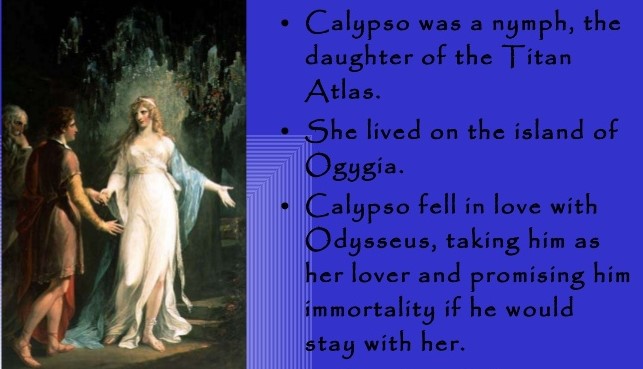|
Word Gems
exploring self-realization, sacred personhood, and full humanity
Odysseus & Penelope
universal metaphors of true love
return to the main-page article
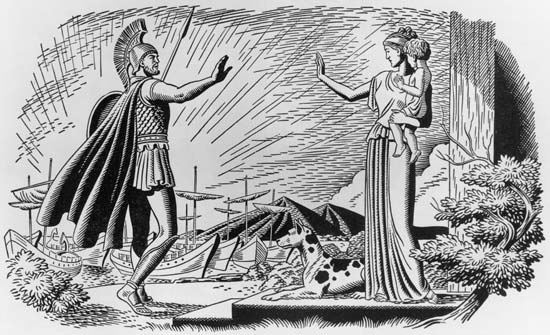
“Epic,” via the Latin, derives from ancient Greek, meaning “word, story, or poem.” It’s a literary form, often a narrative constructed as poetry, typically employed to help a people understand their origins.
The narrative usually features a hero overcoming great obstacles to achieve extraordinary feats. Arguably, the most famous epics of history are the Iliad, the Odyssey, and the Aeneid.
My information on the famous three literary works had been scanty. Recently, however, I reviewed all three epics by listening to 18 hours of lecture by an expert in the field, Dr. Elizabeth Vandiver.
I must confess, I am astonished at the force, elegance, and relevance of these ancient writings; especially, in my opinion, the Odyssey. And I now see more clearly why these epics have survived to our time, and have been referenced thousands of times by writers down through the centuries.
On the main-page, I discussed the confrontation between Odysseus and Calypso. This incident took place in the first half of the Odyssey, during which Odysseus lived as a kind of peripatetic Indiana Jones. In his efforts to return home after the war with Troy, the great warrior, buffeted by disapproving gods, was required to endure all manner of fantastic exploit. He found himself battling the Cyclops monster, was shipwrecked and nearly perished at sea, encountered the mind-controlling Sirens, and even survived a journey to the shadowy underworld to speak to the dead.
|
time out! - sentenced to detention, a mandated season to recall who we are and what's really important
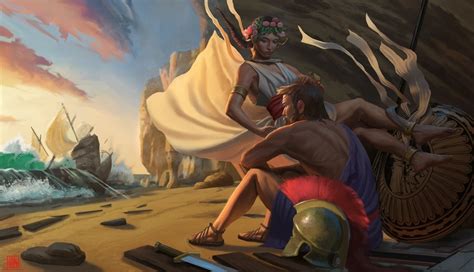
Every day was as the one just spent. Every day he would sit on the shore of the island Ogygia, thinking of his wife Penelope, wishing to return home. Every day he mourned and wept for his lost love.
But Calypso had taken Odysseus prisoner and refused to grant him leave.
Finally, Zeus intervened and sent word to Calypso with orders to release her captive.
do you even remember who you are anymore
In her excellent lectures on the famous Greek myth, the Odyssey, Professor Elizabeth Vandiver comments that life’s sorrows had taken a heavy toll on the noted warrior of the Iliad. But, as his heart was so burdened with daily weeping for Penelope, says Vandiver, Odysseus had now virtually lost himself.
He’d always been a can-do person: resourceful, bold, aspiring, independent, enterprising – Odysseus was the clever one who came up with the winning “Trojan horse” strategy, finally putting an end to the ten-year siege of the famous walled city. But that was many years ago for the one-time near-invincible Greek warrior. These days, each morning, Odysseus had trouble finding reason to stay alive one more day without the girl he loved. When you weep every day, part of you erodes away, you're not the same; when he lost her, he then lost himself. Penelope had accomplished what the entire army of Troy could not -- you got to me, you got to my soul, you brought me to my knees...
|
never thought I'd say please, girl... you got to me... you got to my soul

|
You Got to Me
(1967)
Mama she always told me it would happen, but she never said that it would happen like this, Papa said "some little girl'll catch you nappin', some little girl will get to you with her kiss", you got to me, you brought me to my knees, never thought I'd say please, girl, you got to me, you got to my soul, you got to me, you got control, you got to me, you got to me - you got to be mine... used to slip through every girl's hands like water, there never was one who could ever tie me down, straight ahead and steady as Gibraltar, 'til you brought me tumblin' to the ground, you got to me, you brought me to my knees, never thought I'd say please, girl, you got me, you got to my soul, you got to me, you got control, you got to me, you got to me - you got to be mine…
|
Editor’s note: The mythic Odysseus serves us in another capacity. He is not a man named “John,” far from his “Mary,” and now, beyond judging eyes, feeling at liberty to be untrue to her. In fact, much to the chagrin of the femme fatale Calypso, not even a goddess could substantially tempt him into bed. Truth be told, with eyes open to what’s important in life, and who, despite being forced to cohabit with a goddess, Odysseus is not overly tempted. He just wants to weep now; most truly, Penelope got to his soul. Odysseus becomes a metaphor of Jesus’ discourse, the man who will wait for his authentic beloved though her coming be delayed a thousand summers”; as Odysseus learned, it's "what we stay alive for." See discussion of Jesus' teaching here, essay one and essay two.

|
Odysseus could hardly recall earlier days of self-assurance, competence, and elan. We're reminded of Paul's charge against the inauthentically-living Adrienne: "Do you even remember who you are anymore?"
However, the fact is, he needed to lose himself - his "false self."
three Greek words
Though it’s difficult to see it at the time, from a cosmic perspective, being stranded on a deserted island, alone and bereft, might have been the best medicine for Odysseus, bitter as it was.
What was he, and the rest of the Greek hero-troops, doing in Troy, anyway? Paris and Helen set the world on fire toward some form of retribution, but was it right that thousands of Greek soldiers – fathers, brothers, husbands – should upend their lives, and that of their families, for a decade and more, just to settle a score over an affair and an abduction? Odysseus was part of this national neurosis.
The Iliad, it could be argued, is built around three Greek words which speak to this egoic insanity: (1) kleos, glory or fame, that is, one’s legacy and hope for immortality; (2) time, respect, honor, literally, “what people say about you”; and (3) menis, wrath, fury, rage.
Editor’s note: “Kleos” is a most familiar word we’ve never heard of. It’s part of the name “Hercules”; rather, “Heracles,” which is the original Greek name. “Hercules” is the Romanized version. “Heracles” is a compound word deriving from goddess “Hera,” wife of Zeus, and “kleos” (above) or “glory.” Heracles, the most famous of all Greek heroes, even in ancient times, was fathered by Zeus with a mortal woman. Hera hated all of Zeus’ half-god offspring; however, she reserved a special venom for baby Heracles. She sent a couple of serpents to finish him off in the crib, but the super-tot made short work of them, strangling and crushing them with his bare hands. She would try again. However, the boy’s name, “Hera–Kleos,” for all time, would proclaim his legendary prowess, the one who overcame the formidable Hera, thereby winning for himself eternal glory.
When people invest themselves in, identify with, link their sense of self-worth to, what others think about them, they’re headed for unhappiness. Because when they don’t get the fame and the praise, the gold stars and the pats on the back, or when there’s no satisfaction in these, then the sense of futility sets in - the menis, the rage, the anger, is ignited toward those who, as the ego sees it, failed to “make me feel good about myself.”
there's a time-out, an island of Ogygia, waiting for all of us
Ogygia's zip code is used by many. Lots of us live there. Sort of a revolving door. Funny thing, when your number comes up to spend some time there, to those around you, maybe even in the same house, you might seem fairly put-together. But you'll perceive the difference, you'll know very clearly that something's up in your life.
The Iliad and Odyssey have survived for thousands of years, are foundational writings of Western Civilization, because they speak to a universal problem of what it means to be human.
And I will tell you this: This world, and the next, is constructed, such that, one is not allowed to get very far down the road of activity and endeavor before some form of “detention,” a time-out to make us stop and consider, comes into play. For Odysseus, it was seven years. That might be a good average; what I mean is, think about your life, and notice how it divides itself into phases or compartments of five years or ten years – let’s call it “seven years” (which number, in ancient literature signified a “perfection” or “fullness”).
Every “seven years” we seem to be thrust into a new “classroom” of life. What we thought, for sure, would work out as something good, now, in hindsight, was a mistake or a detour or worse. That opportunity we were so convinced would “make me happy” hardly lasted a fortnight. The tide comes in and the tide goes out. We enter periods in our lives when some things seem to be working fairly well, but then – often, without warning – our fortunes turn, or our eyes open to what should be, and now we’re cast upon the shores of a forbidding Ogygia. During this “wilderness” period, nothing can be made to go right. It’s just one bad thing after another, we can’t get from here to there, no matter how hard we try. And now we're on the beach every morning with Odysseus, oppressed by visions of what you were meant to have.
who we truly love, and what is most important to us
These personal episodes of custom-crafted Ogygia do not necessarily send us across the country to a new geographical location – although this is possible, and does happen – but, what we can count on is that, in some form or fashion, we will find ourselves isolated, cut off, far removed from what is dear to us. The details will be different for each individual, and, even as you read these words, you are already bringing to mind how this worked out in your own particular situation.
These are our times of “detention,” when full-bodied participation in life, in love, in work, in whatever is meaningful to us, will be denied. Calypso stands at the door, barring our way. She purrs to offer a tempting bribe to choose another way - which will sound quite reasonable as there is, in fact, no raft of escape from the island, and so who could blame you, you know. However, in the midst of tantalyzing contrary allurement, for the sighted, all we'll be able to do – allowed to do -- is to think about our lives: who we truly love, and what is most important to us. It's an invitation to "life review" before the popularly-imagined appointed time. "Why wait, buddy?" say the Spirit Guides, "do it every day of your life."
During these times of enforced “warming the bench of life,” we always have at least one good choice. We have power to determine our attitude toward, and to find meaning in, suffering: we can surrender to the lessons God would have us learn, or we can lash out in bitter menis. We can make little speeches about how unfair life is, blame others, engage in self-pity, and tell our “victim story.” But, if we engage in such theatrics, we shall not be surprised to discover, upon crossing over to the next world, a new and more substantial “dark detention” waiting for us.
We're not allowed to cut class, and those who try this will find their liberties temporarily suspended. Those in "upper management" of the Universe have no sense of humor and little forbearance about us destroying ourselves. As Adrian Smith said, we're not allowed to delegate away or abrogate the "Absolute Sovereignty of the Individual" principle - this means "sane individual" as our scope of authority over our own lives does not extend to self-perdition.
Calypso isn't so crazy about the idea, but we'll yet grow to see the wisdom in the "tough love."
|
It took 10 years after the war for Odysseus to make it home; had things gone his way, the trip could have been done in just many days. Finally, however, in a ship supplied to him by a kindly people, Odysseus landed on his home shores of Ithaca, a Greek city-state. He’d been gone for 20 years.
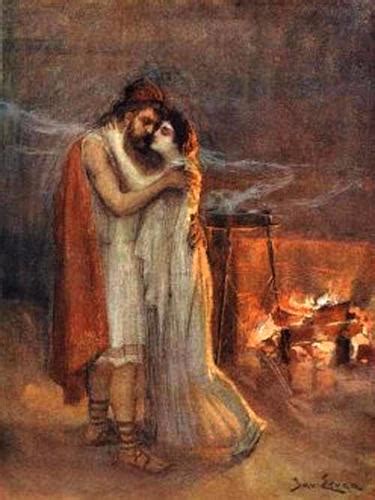
why should we think about these things
While the first half of the book, as mentioned, deals with larger-than-life ordeals, the entire second half focuses upon Odysseus’s efforts to reclaim the life he’d left behind. But the dangers to his person were not over. However, this section of the epic shifts gears, things slow down, with action less prominent; though, he’ll get to that. There’s more time for introspection now, and the reader learns about the private life of the heroic soldier of the Trojan War.
why is this important to us
As I entered the second half of the book, a certain sense of universal theme met with me. I began to perceive that what happened to Odysseus, in one form or another, will happen to all of us. On this level of interpretation, the writing speaks to us personally, and, I would say, is the real reason it’s survived to our own day.
Most of us will not be lauded as a great warrior, but virtually all of us will experience the trauma of making one’s way home after devastating loss.
picture the situation
He’d been given up for dead. The last battle of the Trojan War was 10 years prior. No one had heard from him in a decade.
And Odysseus was not just a great military man. He was the leading figure in his home city-state. He was king there. He’d been the law there. But now, though his reputation was formidable, the long absence had emboldened criminal-types in society.
Penelope didn’t know what to do. Was she a widow? She wasn’t sure. Should she continue to wait, now 20 years, for her illustrious husband? It wasn’t that simple. A group of 118 suitors, men intent upon marrying Penelope, had gathered, but with evil motivation.
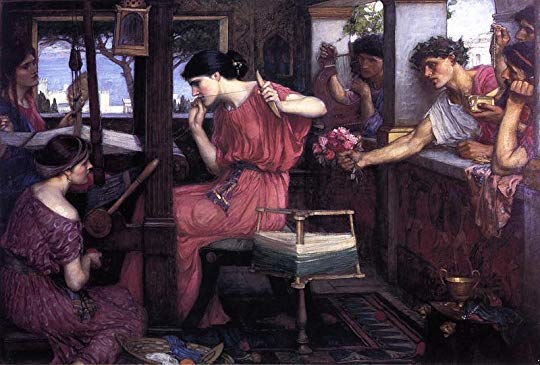
They were becoming more forcible in their demands that she choose one of them. But this was not about love. She was the queen of the city-state, and the man who won her would become king. Her life was in danger.
Son Telemachus, a baby of several months when Odysseus went off to war, was now about 21. He lacked experience in terms of protecting his mother from the increasingly menacing mob. The 118, while Telemachus was away on a business trip, decided that when he returned they would kill him.
Odysseus suspected and sensed that Penelope was in trouble, but news from home was hard to come by
He knew that it was just a matter of time before vultures attempted to take that which belonged to him by right. Thoughts such as these burdened his mind as he sat on a lonely beach with Calypso.

Editor’s note: On the Word Gems homepage, there’s a featurette of a boy lamenting his loss, whispering, “a hand for each hand was the plan for the world, why don’t my fingers reach? millions of grains of sand in the world, why such a lonely beach?” – we must dedicate this image to Odysseus.
Also in that section on the homepage, I state that a time is coming when,
in one missed heartbeat, all of the current scenery and stage-props, along with unsavory characters in our lives, will be gone. Right now it all seems so permanent, but, in that missed heartbeat, we will enter a new phase of our eternal lives, with closest friends and dearest ones, those lost to us on our pilgrimage, returned to rightful owners. This, indeed, ‘was the plan for the world’…
Odysseus had lost Penelope on his pilgrimage. How could he obtain news of her situation? He discovered a way, which, in principle, is open to all of us during a time of news blackout concerning those we’ve lost.

During his journey to hades, he spoke with a discarnate who informed him of Penelope’s dire strait, confirming what Odysseus feared. Penelope was in trouble. And now he sought all the more to return to Ithaca as quickly as possible.
There are lines of communication open and available to each of us concerning lost loved ones. The Spirit World, via competent psychic-medium, can be accessed for us to learn what we need to know. Likely, there will be difficulty in finding a reputable medium, but they do exist, and if you make it a priority to accomplish this, you have every chance of succeeding.
the lost
In this world, we lose people we love in many different ways. Every situation will be different. Though the facts will vary, the trauma of loss will be the same. It’s a universal theme.
If it hasn’t happened for you yet, you might think that 20 years is a long time. The reality is, a day might come when you’d gladly settle for only 20 years; it could be much longer, depending on what lessons Spirit Guides deem it necessary for you to learn during your time here, on the “sorrowful planet.”
Regarding Odysseus and Penelope, I will leave it to your own studies to learn of what happened to the 118. Let’s just say that Odysseus was not amused at what they were trying to do and put a severe crimp in their style, if you know what I mean.
Again, each situation will be different. But the universal theme and the universal lesson is this: During our difficult but, mercifully, temporary time in this world, we will assuredly lose people we love. It might be our own fault; there’s a lot of that going around. In retrospect, I have no doubt, Odysseus would have used his influence to convince the troops not to go to Troy on some half-baked quest for empty honor. He shouldn’t have left her.

"I'm sorry I left you, Lois"
Regrets such as these are also a universal theme. Because, when we violate such precept, in one’s absence, Penelope may be forced to go on with some semblance of life, committing to things, she knows, in her heart of hearts, are not right. And who’s to blame for that?
there is no epic of the certainties
A long time ago, in my readings of the books by Pastor Dr. Leslie Weatherhead, I came across his phrase, “there is no epic of the certainties.” A jarring phrase, in his discussion of the meaning of suffering.
He meant to say, “Whether you like it or not, if you want to do the right thing, life is going to require you to live heroically. It won’t be easy to do what’s required for you. Your path will be filled with sorrow and trauma, and many times the way will be unclear. Don’t expect otherwise. Life in this world isn’t so predictable so be prepared for anything, whatever difficult lesson God requires you to learn. It won’t be cut-and-dried for you, you won’t easily slide into success, because – there is no epic of the certainties.”
a final beautiful metaphor of true love from Odysseus and Penelope
As a young man, about to marry Penelope and build a life for themselves, Odysseus selected a sturdy tree. He would build their house around it. But there’s more.
The tree would form one of the four corners of their marriage bed. And so, he built the bed around the solid tree trunk, and then built the bedroom around the bed, and then built the house around the bedroom.
Is this not a beautiful concept of enduring, unmovable, true love?
Further, when he first met with Penelope after his long journey, there was no immediate joy and running into his arms. Suddenly she became frightened, her mind filled with doubts, and would not believe that it was really Odysseus before her. She had prepared herself so well to believe that she would never see him again that, in the beginning, she could not accept what her heart had yearned for.
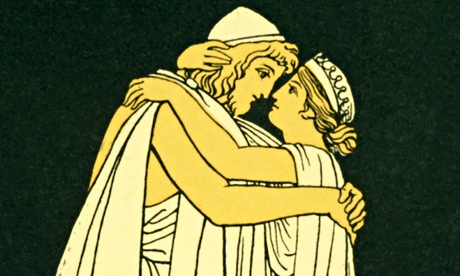
How could he convince her? He decided to speak of their special bed, the knowledge of which had not been shared but with one trusted servant. With this intimate knowledge, she knew that her lost love had indeed returned.
Even in this, I think, we see universal theme and metaphor. Lovers share certain experiences which only they are privy to. Certain delicious memories become identifying markers which no one else could ever duplicate or invade.
|
Editor's last word:
The word "Odysseus" in the Greek means "pain" or "trouble." It is the pain and trouble we cannot escape when we come to this world.
The question becomes, how will we deal with it? Will we conduct ourselves honorably and thereby craft an heroic epic for ourselves, which our future families will venerate and learn from?
No one said it would be easy, there is no "epic of the certainties," and many of us would gladly settle for 20 years.
|
|



